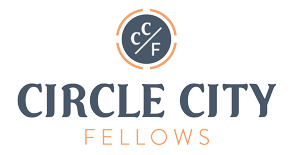Monday Matters
Welcome to Monday Matters, a weekly email digest from Circle City Fellows. CCF is an Indianapolis-based nonprofit that helps young adults learn about the roles their personal faith and spirituality can play in their career and vocation.
As part of their 9-month program, fellows gather weekly to learn from and discuss some of the world’s greatest thinkers and writers on these subjects. We like to share excerpts of this content with you, so you might also grow in faith and formation and understand more of what we’re about here at CCF!
This week, fellows are diving into Andy Crouch’s book, Culture Making: Recovering our Creative Calling. This reading continues to be an influential and paradigm-shifting favorite of our fellows each year. We recommend picking up the book!
But in the meantime, read this excerpt from Chapter 6 and consider how your work (whether part of a more traditionally creative field or not) contributes to the creation and maintenance of culture in our world. What “cultural goods” are you contributing to your community or city?
If Genesis 1 was about humanity’s amazingly dignified position in the cosmos, Genesis 2 is about humanity’s call to culture. Indeed, if Genesis 1 is the prologue – the grand scene-setting vision of the goodness of God’s creativity and the central place of his image-bearers in the whole great process – Genesis 2 is where the story properly begins. For here we find humankind not just ushered onto a universe-wide, six-day stage of cosmic beginnings but placed in a human-scale environment. We begin with a single, vulnerable individual (Hebrew adamah, as yet undifferentiated into male and female) in a garden. And a garden, of course, is not just nature: it is nature plus culture.
One of my southern relatives used to like to tell the old story of a city slicker (I think he had me in mind) who visited a farm far out in the country and remarked with awe, “Isn’t God’s creation beautiful?” The farmer looked at him skeptically and said, “Well, you should have seen it when God had it all to himself.”
Yet in Genesis 2, God has already gotten his hands dirty – forming not just the man but also his initial cultural environment. God has seeded the world, as it were, with cultural goods. Adam is not set to work carving a non-existent garden out of wilderness. From the very beginning he benefits from the Creator’s own cultural initiative. Here we get a crucial correction to a potential misunderstanding of our definition of culture as what we make of the world (and a gentle rebuke to the farmer’s understandable skepticism): it is not just nature that is God’s gift to humanity. Culture is a gift as well. In the biblical view culture is not simply something we have made up on our own – God was the first gardener, the first culture maker. As in Genesis 1 he asks us not to do something fundamentally different but rather to imitate him – in Genesis 1, to imitate his creativity and gracious dominion over the creation,and here in Genesis 2, to imitate him by cultivating the initial gift of a well-arranged garden, a world where intelligence, skill and imagination have already begun to make something of the world.
Genesis 1 is above all about the Creator’s creativity and humankind’s creativity in God’s image – with a secondary emphasis on the role of cultivation in taking proper care of creation. But in Genesis 2 the primary emphasis is on cultivation. The Creator is also a Cultivator, “planting” a garden in the east and arranging its contents. “Out of the ground the LORD God made to grow every tree that is pleasant to the sight and good for food” (Gen 2:9) – notice the emphasis, as in a well-tended garden, on the combination of the beautiful and the useful. He has carefully chosen its location, adjacent to a river and near deposits of precious minerals and the aromatic gum tree that produced a pearl-like substance called bdellium: “the gold of that land is good; bdellium and onyx stone are there” (Gen 2:12). This is not ex nihilo creativity – it is paying attention to what already exists and what will be the most fruitful and beautiful use of it; most of all, what will most contribute to the flourishing of the human beings he is about to create.
Food for thought:
Some careers and vocational fields are more stereotypically defined as “creative:” visual and performing arts, writing, architecture, etc. But because God is a creator and we are created in God’s image, all of humanity has a role to play in creating culture. What are you creating? Is it a building plan, some marketing material, a clean environment? Are you creating a workplace in which employees can thrive, or perhaps a balanced and integrous budget? This week, spend some time thinking critically and creatively about the ways your work output reflects the “cultural mandate” given to us by God.
Have you connected with us elsewhere? Find us on Facebook, Instagram, or LinkedIn.

